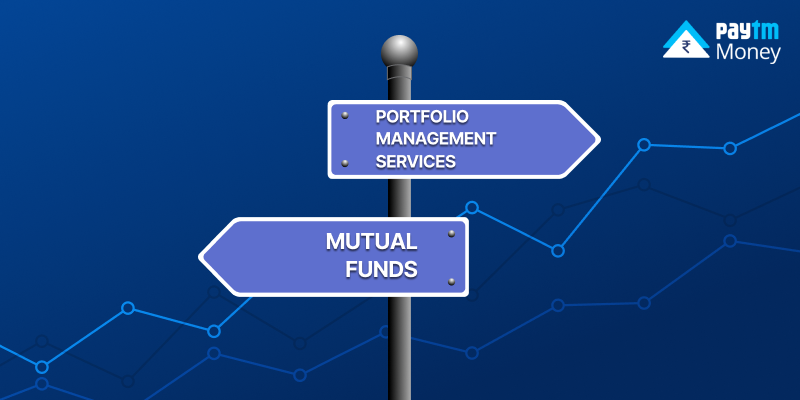Mutual Funds vs PMS5 min read
What Is A Portfolio Management Service (PMS)?
A Portfolio Management Service (PMS) is professionally managed investment service where qualified fund managers take charge of investors’ money by investing in securities like stocks and bonds.
What is a Mutual Fund?
A Mutual Fund is a professionally managed investment fund that pools in funds from various investors & invests it in securities like stocks and bonds.
They both sound similar, right? So, What’s The Difference?
Main Difference Between PMS & Mutual Funds
Firstly, PMS has a minimum investment requirement of Rs. 50 Lakhs whereas a Mutual Fund SIP can start from as low as Rs. 100.
The difference also lies in their investment strategy which is based on risk parameters and return expectations.
Other Differences
Performance
Understandably, this is the main criteria that most investors look for before selecting an investment avenue. While past performance may not guarantee future returns, it gives a good perspective.
Customization
In a PMS, the portfolio is designed for a select group of investors, unlike MFs which are for everyone. PMS is better as the investor can decide on specific sectors, capitalization, and allocation. PMS portfolio managers are well-versed in domestic & global markets and are skilled to make the most optimum decisions for each investor portfolio.
Flexibility
An equity Mutual Fund has to invest a minimum 65% in equity irrespective of the market condition whereas PMS is flexible with its investments and can increase or decrease the allocation to equity based on market scenarios and investor requirements.
Therefore, PMS has the potential to outperform the markets.
Focus
A PMS can focus on performance and can make investment decisions such that the absolute returns are maximized. It can focus more on returns as compared to a Mutual Fund which has to take care of diversification rules, valuation guidelines and redemption related regulations.
Investment Status
As an investor, your portfolio is considered different from every other portfolio by the PMS. So, the decisions are made as per your investing needs, financial conditions and risk profile.
However, in a Mutual Fund, investments are pooled and invested irrespective of individual differences and needs.
Further, redemptions by other investors does not hamper your portfolio in a PMS unlike a Mutual Fund in which the value, liquidity etc. are affected.
Transparency
A PMS is required to make timely disclosures to the client. But these are not freely available to the public. Moreover, it is not easy to assess and compare the performance of different PMS products. In the case of MFs, they are strictly regulated and all the information is public. You can easily compare performances.
Fees
A PMS charges an entry load, management fees, and either a fixed fee or a performance fee. There are PMS providers that charge on the basis of profit made, which is a good way to ensure the fund manager delivers the required returns.
A typical example of fees in a PMS consists of 3 options :
a) Fixed fee: 2.5% AMC Per annum + zero performance fee (or)
b) Hybrid Fee – 1% per annum fixed fee + performance fees of 15% share above a hurdle of 12% no catch up (or)
c) Performance-based fee – Zero fixed fees + 20% performance fee above 8% hurdle
Taxation
Long-term capital gains in equity mutual funds are taxable at 10 % per annum + cess & surcharge without indexation on gains above Rs 1,00,000 in a financial year. Short-term capital gains are taxable + cess & surcharge. Moreover, mutual fund scheme owners have to pay tax only on redemption.
The tax on PMS is not as efficient. You pay short-term or long-term capital gains on every transaction in Demat account holding shares, The PMS tries to compensate for this by giving higher returns.
Process and Documentation
Investing in mutual funds is easy and there are multiple channels to buy and sell schemes. The investment process for PMS is more tedious considering the higher value of transactions. There is quite a lot of documentation and time required to set up the PMS account.
Why is PMS is more efficient than Mutual Funds:
Let’s say that a MF and PMS both have a 10 stock portfolio. When the market corrects and few of investors redeem the MF, it has a negative impact for the investors who stay put in the portfolio as the MF has to honour the redemption. On the other side, if you invest when market corrects in a MF, your inflow will benefit all investors in the MF.
However, in a PMS, the redemption in one account will not affect other investors as each investor portfolio is held in a different Demat account. On the contrary, it will positively impact the investor’s portfolio if they add stocks to their investment when market is down.
PMS is a highly beneficial service to investors who are either very busy with their own businesses or who lack the technical expertise in investments. Customization of investments is the most sought-after feature of PMS. It enables active management of portfolios in which an investor can decide on the type of shares (market capitalization/sector wise) or asset classes s/he wants to invest in.
Disclaimer: Investment in securities market are subject to market risks, read all the related documents carefully before investing. This content is purely for educational, information and investor awareness purpose only and in no way to be considered as advice or recommendation. Paytm Money Ltd SEBI Reg No. Broking – INZ000240532. NSE (90165), BSE(6707) Regd Office: 136, 1st Floor, Devika Tower, Nehru Place, Delhi – 110019.




